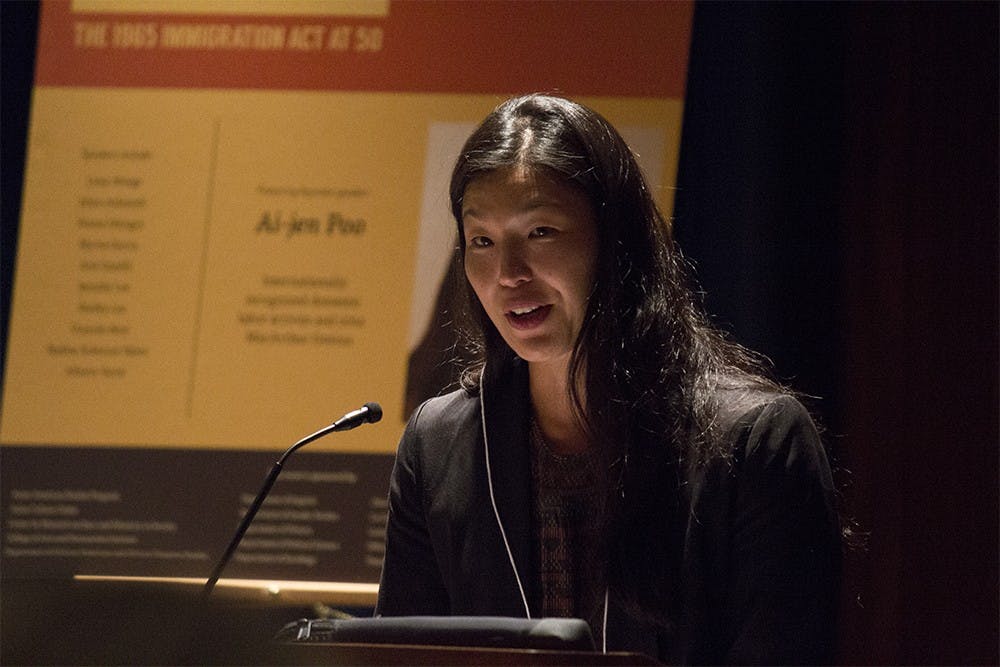She discussed conditions in the caregiving industry, which employs many immigrants. Poo was the keynote speaker in an IU-Bloomington Themester Symposium entitled “Politics, Premises, Possibilities: The 1965 Immigration Act at 50.”
Poo, a labor activist and 2014 MacArthur Fellowship recipient, asked the audience to take five minutes to reflect upon a time in their lives when they had moved and why they had made this change.
“What I’ve learned in doing the work that I do is that people who cross borders to migrate here from another country do it for essentially two reasons, for life and for love,” Poo said.
The daylong symposium event celebrated the 50th anniversary of the 1965 Immigration and Naturalization Act, as a part of the semester-long “@Work: The Nature of Labor on a Changing Planet” Themester program organized by the College of Arts and Sciences.
“Given the moment that we’re in right now in this country, we really are at another crossroads and have very important choices to make about immigration,” Poo said. “So it’s a perfect moment to reflect.”
Organizer and acting director of Asian-American studies Jennifer Lee said planning for the event began last semester with the idea of creating a multidisciplinary approach to the discussion of immigration.
“It was important for it to be multidisciplinary so all of us talk about it,” Lee said. “To come together and talk together, it makes since.”
The symposium, organized in partnership with Asian-American studies, Latino studies, the Asian Culture Center and La Casa Latino Cultural Center, sought to analyze the influence of the Immigration and Naturalization Act of 1965 on civil rights, labor practices and American identities.
The act, signed into law Oct. 3, 1965, eliminated American immigration quotas based on nationality and created new policy to benefit immigrant families and attract skilled labor in the U.S.
Encouraging debate on the effect of this act and its application to modern immigration challenges in America, the symposium had two panel discussions, featuring speakers representing multiple ethnic backgrounds.
Taking questions from the audience, Shelley Lee, an associate professor of comparative American studies and history at Oberlin College, said while she believes the Immigration and Naturalization Act of 1965 was a turning point in immigration policy, she feels it can sometimes be used to periodize immigration reform and not focus on studying what has been done in the 50 years following the act.
“It’s a turning point, but that doesn’t give us an excuse not to critically examine that period after it,” Shelley said.
Highlighting a 100-mile walk of 100 immigrant women welcoming Pope Francis to America last month, along with other personal stories, Poo illustrated examples of change that can be made on the local level in current immigration policy and in the industry of caregiving, where immigrant workers are often mistreated.
“We all have a stake in our country making a real investment in caregiving,” Poo said. “In fact, if we don’t do that, we’re going to be heading toward crisis because of the demographic changes, all of us, even middle class and upper-middle class folks. So we need a solution, and let’s make sure that everyone is at the table working together as the solutions emerge.”
Junior Jill Marsden said she was struck by Poo’s efforts to bring multiple groups together to elicit change.
“She has so much context for policy spheres for both immigration and healthcare administration for elderly people,” Marsden said. “Which is so important because a lot of the advocacy that has been done only focuses on one of these things.”
Poo ended her talk with the same suggestion with which it began.
“I have faith that as this entire nation changes and ages and as you all represent the people who will lead us into the future, that we as a country have a unique opportunity to choose life and love over racism and hate,” Poo said. “And become ultimately, mostly love.”





